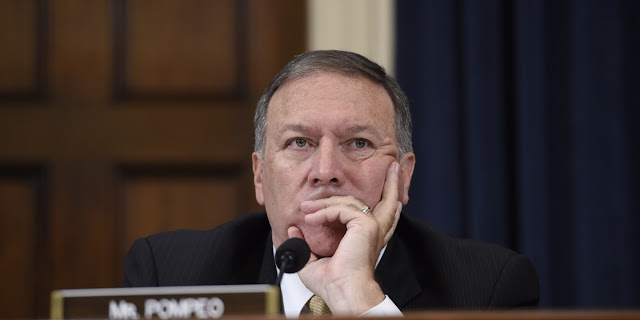Top photo: Pompeo listens at a
hearing of the House Select Committee on Benghazi.
President Obama indicated on
Friday that he won’t pardon NSA whistleblower Edward Snowden, even as
President-elect Donald Trump announced his pick to run the CIA: Kansas
congressman Mike Pompeo, who has called for “the traitor Edward Snowden” to be executed.
Pompeo has supported nearly
unfettered NSA surveillance, has blamed Muslim leaders for condoning terror,
and is one of the most
hyperbolic members of Congress when it comes to describing the Islamic
State, which he has called “an existential threat to America” and “the most
lethal and powerful terrorist group ever to have existed.”
In an
interview with Obama published on Friday, German newspaper Der Spiegel
asked: “Are you going to pardon Edward Snowden?” Obama replied: “I can’t pardon
somebody who hasn’t gone before a court and presented themselves, so that’s not
something that I would comment on at this point.”
But P.S. Ruckman, editor of the
Pardon Power blog said Obama is wrong
to suggest he couldn’t pardon Snowden if he wanted to. Ruckman noted that
Obama has previously only granted pardons and commutations to people who have
already been convicted. “I just think what he may have better said is: ‘I
prefer that he present himself to a court and then we’ll talk turkey.’ But
technically in terms of the Constitution, there are no restrictions at all.”
The operative Supreme Court
ruling, from
1886, states that “The power of pardon conferred by the Constitution upon
the President is unlimited except in cases of impeachment. It extends to every
offence known to the law, and may be exercised at any time after its
commission, either before legal proceedings are taken or during their pendency,
or after conviction and judgment. The power is not subject to legislative
control.”
Obama said that although
Snowden “raised some legitimate concerns,” he “did not follow the procedures
and practices of our intelligence community.”
Obama also suggested that the
debate is between people holding two extremist positions: people who “think we
can take a 100-percent absolutist approach to protecting privacy” and “those
who think that security is the only thing and don’t care about privacy.”
Very few people actually occupy
either extreme. But Pompeo, a three-term congressman and former Army
officer, is about as close as it comes to the latter.
In a 2014
letter, Pompeo accused Snowden of “intentional distortion of truth
that he and his media enablers have engaged in.” Pompeo supports virtually
no legal barriers to having the NSA spy on Americans, and has alarmed civil
liberties advocates with many of the positions he has taken while serving on
the House Intelligence Committee. Not only has he argued that the NSA should
resume its phone records program, he has called on Congress to “pass a law
re-establishing collection of all metadata, and combining it with publicly available
financial and lifestyle information into a comprehensive, searchable database.”
“What’s needed is a fundamental
upgrade to America’s surveillance capabilities,” reads a Wall Street Journal piece
Pompeo co-wrote in January.
Pompeo is also a staunch
defender of the prison at Guantanamo Bay, calling it an “important
national asset,” and repeatedly arguing that closing the facility would
endanger Americans. He has also defended CIA torturers, saying
that “these men and women are not torturers,” and that “the programs being used
were within the law.” He called the exhaustive, 6,000-page Senate torture
report “some liberal game being played by the ACLU and Sen. Feinstein.”
Civil liberties groups
immediately expressed concern about Pompeo as CIA director. The position
requires Senate confirmation.
“Congressman Pompeo’s positions
on bulk surveillance and Guantanamo Bay also raise serious civil liberties
concerns about privacy and due process,” the ACLU said in a statement.
“These positions and others merit serious public scrutiny through a
confirmation process. His positions on mass surveillance have been rejected by
federal courts and have been the subject of several lawsuits filed by the
ACLU.”
Pompeo has also accused Islamic
faith leaders of being “potentially complicit” in the 2013 Boston Marathon
bombing. “When the most devastating terrorist attacks on America in the last 20
years come overwhelmingly from people of a single faith, and are performed in
the name of that faith, a special obligation falls on those that are the
leaders of that faith,” Pompeo said in a speech on the House floor. “Instead of
responding, silence has made these Islamic leaders across America potentially
complicit in these acts and more importantly still, in those that may well
follow.”
Because numerous Islamic
leaders had in fact condemned the attack, the Council on American Islamic
issued a letter calling
his remarks “false and irresponsible,” and urged him to publicly correct
them.

No comments:
Post a Comment